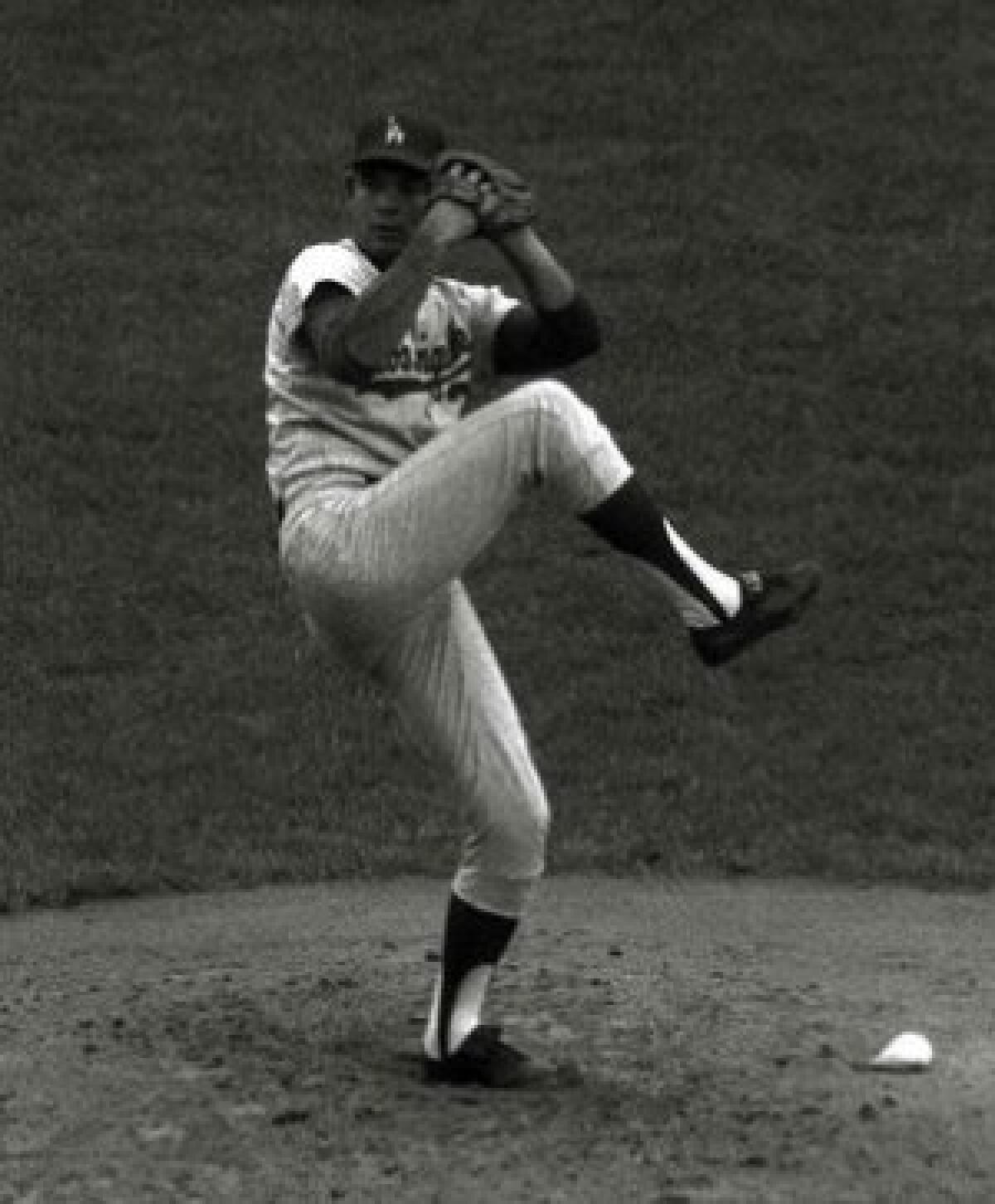Nick Willhite dies at 67; former pitcher for the Dodgers and Angels

- Share via
Nick Willhite
Pitcher for Dodgers
Nick Willhite, 67, a left-handed pitcher whose five-year baseball career was highlighted by the shutout he threw in his debut with the Dodgers in 1963, died of cancer Sunday at a son’s home in Alpine, Utah.
Willhite was born Jan. 27, 1941, in Tulsa, Okla., and grew up in Denver, where he starred in baseball and football in high school. He was signed by the Dodgers in 1959, earning a $50,000 bonus, and called up in June 1963.
A 6-foot-2, 195-pound starter and relief pitcher, Willhite was shipped to the Washington Senators after the 1964 season but was reacquired by the Dodgers early in the 1965 season. The Dodgers won the World Series that year, but he did not make an appearance in the series against the Minnesota Twins. After the 1966 season the Dodgers again traded him, to the Angels, who then traded him during the 1967 season to the New York Mets. He was out of baseball by age 26, with an overall record of 6-12 and a 4.55 earned-run average.
Willhite bounced around from one job to another, working as a pitching coach at Brigham Young University and in the Milwaukee Brewers and New York Yankees organizations.
Divorced three times and living on the streets of Salt Lake City as a drug and alcohol addict, he reached out to another former Dodger pitcher, Stan Williams. Williams put him in touch with the Baseball Assistance Team, which helps former baseball players in need. Willhite entered a treatment center in 1989 and eventually became an addictions counselor.
Robert Schlitt
TV writer had extensive credits
Robert Schlitt, 75, a writer and producer who worked on such TV programs as “Matlock,” “Father Dowling Mysteries” and “The Monkees,” died of cancer Nov. 25 at his Encino home, his family said.
Schlitt and his writing partner Peter Meyerson collaborated on what became the first episode of “The Monkees” TV series in 1966. Schlitt continued to write for “The Monkees” and other TV series from the 1960s to the ‘90s, including “Hawaii Five-O,” “The Streets of San Francisco” and “Lou Grant.”
In addition to writing extensively for “Matlock” and “Father Dowling Mysteries,” Schlitt also became a producer on those shows.
He also wrote for other media, including the screenplay for “Been Down So Long It Looks Like Up to Me,” a 1971 film based on Richard Farina’s novel.
Schlitt translated into English the French comedy “The Egg” by Felicien Marceau, which played on Broadway in 1962 as well as at UCLA’s Schoenberg Hall the previous year.
Schlitt was born July 24, 1933, in Brooklyn, N.Y. He served in the Army in the 1950s and, while based in Frankfurt and Paris, played in a military jazz band, his family said. After earning a bachelor’s degree in literature at Columbia University in 1957, he returned to Paris and found work as an actor and musician.
Robert Poos
Vietnam War correspondent
Robert Poos, 78, who covered the Vietnam War as a reporter for the Associated Press and later was managing editor of Soldier of Fortune magazine, died Monday at a hospice in Arlington, Va., said his wife, Bobbie. He had suffered respiratory ailments and a broken hip.
A Marine during the Korean War, Poos joined the AP in 1957. Assigned to the AP’s Saigon bureau in 1965, he quickly became noted for aggressive and daring combat reporting.
During the January 1966 battle of An Thi, where U.S. cavalry troops were surrounded by Communist forces, Poos and AP photographer Henri Huet helped recover and stand guard over wounded GIs.
Two months later, Poos was wounded in the chest when gunmen attacked a Buddhist pagoda in Danang, where he and other journalists were covering a standoff by anti-government monks.
In late 1966, Poos was named chief of AP’s bureau in Kuala Lumpur, Malaysia, and later was a news editor in Tokyo before returning to the U.S., where he spent two years in AP’s Washington bureau. After leaving AP in 1970, he was a spokesman for the American Railroad Assn.
Later, as managing editor of Soldier of Fortune in the 1980s, he wrote about military topics. Robert K. Brown, a former Green Beret who is editor and publisher of Soldier of Fortune, called Poos the magazine’s “first professional” journalist and said he brought expertise and real experience to readers.
Poos studied journalism at Southern Illinois University.
-- Times staff and wire reports
More to Read
Sign up for Essential California
The most important California stories and recommendations in your inbox every morning.
You may occasionally receive promotional content from the Los Angeles Times.










